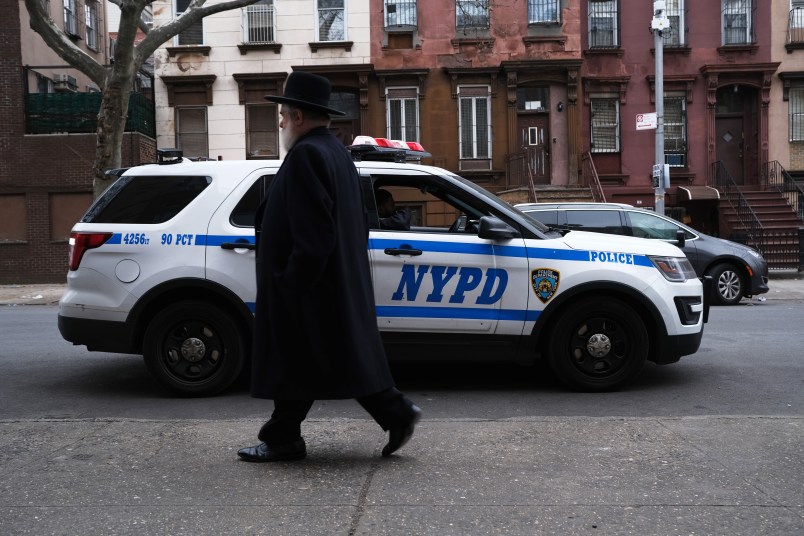After the poisonous response I got to my book, Genesis: Truman, American Jews, and the Origin of the Arab-Israeli Conflict, I vowed to stay out of discussions about Jews and Israel, but I keep breaking my resolution. Most recently it is over the coincidence of the anti-Semitic attacks in New Jersey and New York and New York Times’ columnist Bret Stephen’s column on Jews and anti-Semitism, in which he manages simultaneously to reinforce one of the historic tropes of anti-Semitism — that Jews are a superior race — and blame critics of Israel’s rightwing government for the outbreak of anti-Semitism.
Two different kinds of anti-Semitism can be found today in the U.S., Europe, and parts of Asia. The first is the recurrence of the anti-Semitism inflamed by toxic nationalism that swept Europe in the 19th century and culminated in the Holocaust. It is based on the idea that Jews are an alien presence in nations and exercise power in government, business, finance and the media way out of proportion to their numbers. I suspect it played a strong role in the recent attacks in the U.S. It has re-emerged in Germany in the Holocaust revisionism of some leaders of the Alternativ fur Deutschland (AfD) and in Hungary’s government, which is on excellent terms with Israel’s right-wing government, but which has evoked centuries-old animosities against Jews with its massive public campaign against Hungarian Jewish ex-patriate George Soros.
The second kind of anti-Semitism can be found among Arab foes of the Israeli Jewish occupation of what was once Palestine. Palestine’s Arabs (and the Turks who controlled that 19th century region) discriminated against the region’s small population of Jews and Christians, but they did not embrace the anti-Semitism that had begun to flourish in Europe. It was religious discrimination, and the Jews of Palestine found ways around it. But after the Zionist movement began in 1890s to settle in Palestine with a view toward establishing a Jewish state in an area where Arab Muslims had predominated for 1400 years, Arab leaders began to embrace a kind 0f anti-Semitism that fused opposition to a Jewish state with opposition to Jews and Judaism. At the 1929 hearings on the riots that shook Jerusalem, the Mufti, the religious leader of Palestine’s Arabs, can be seen in photographs perusing a copy of The Protocols of Zion. This kind of anti-Semitism, rooted in the Israeli occupation, persists not just in the Middle East but among Arabs who have emigrated to Western Europe. The danger facing Jewry in the U.S. and Europe is precisely from the fusion of these two kinds of anti-Semitism.
Unfortunately, the reaction to this renewed outbreak of anti-Semitism has partially served to reinforce it. First, consider Stephens and other Americans or Europeans who now equate harsh opposition to Israel with anti-Semitism. Stephens writes, “It’s no surprise that Jew hatred has made a comeback, albeit under new guises. Anti-Zionism has taken the place of anti-Semitism as a political program directed against Jews.” Personally, I consider a two-state solution, which would allow Palestinians’ self-government, the best of options, but if Israel continues to rule over the West Bank and indirectly over Gaza, the only other democratic option is to grant the Palestinian Arabs that Israel now subjugates the right to participate fully in Israel’s political and economic life. That would end the Jewish state as such, but if Israel continues its current colonial policies, it is the only just alternative. What Stephens and the Israeli government do is equate anti-Zionism with opposition to Judaism itself. In doing so, they don’t combat, but reinforce, the second kind of anti-Semitism rooted in the Israeli occupation. They are not foes, but enablers, of the growing anti-Semitism.
The second of ill-conceived reactions to the outbreak of anti-Semitism is more common on the left than the right. It is to deny the existence of the re-emergence of historic anti-Semitism and to attack critics of it as being motivated by ulterior motives — chiefly the defense of Israel’s occupation. Instead of naming names, I’ll take some of the blame myself. My first reaction to British and American critics of anti-Semitism within the British Labour Party was to attribute their criticisms to defense of Israel or, in the case of Tony Blair-Laborites or Tories, to a partisan attempt to undermine Jeremy Corbyn. I don’t doubt these were factors in the criticisms of Corbyn, but what I discovered when I looked into the matter was that there was a left-wing version of anti-Semitism that combined opposition to Israel with historic nonsense about the Rothschilds and Jewish bankers. To deny this kind of left-wing anti-Semitism — as French leftist Jean-Luc Melenchon was quick to do during the British election — is to reinforce the view of Stephens and the other defenders of Israel who want to equate opposition to Zionism with anti-Semitism. And the circle goes on.
I wouldn’t end this discussion without some mention of Donald Trump. I never bought the idea that Trump is an anti-Semite. If anything, he is the worst kind of philo-Semite. He has reinforced the opposition of Sheldon Adelson and Jared Kushner to Palestinian self-determination. He has equated criticism of Israel with anti-Semitism. But he has also loosened the bonds of conscience that have kept in check the most violent and irrational impulses in American society. He is not responsible for the anti-Semitic attacks in Pittsburgh or recently in New York and New Jersey — to charge that would be to indulge the excesses of Trump Derangement — but his contempt for reasoned discourse and public self-control (for which the President is supposed to set an example) has helped to allow the dark side in American politics and life to see the light of day.






